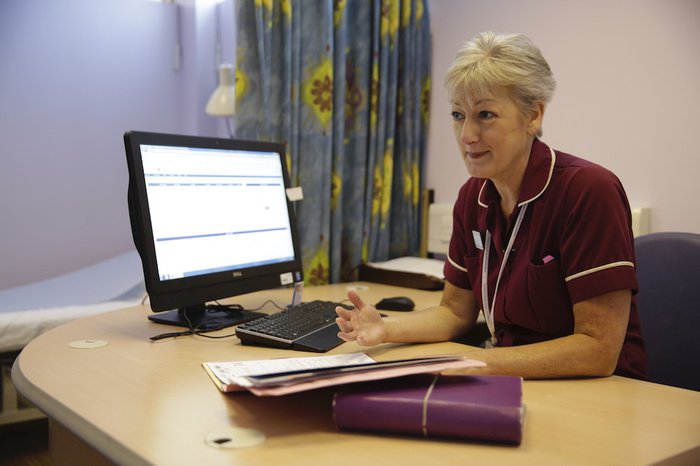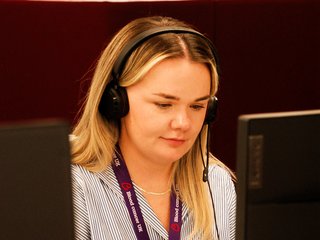Clinical trials: How we're going to make sure everyone's included
Clinical trials are a crucial part of getting new treatments to people with blood cancer. But many clinical trials struggle to recruit enough patients to take part in their research, with people from minority ethnic groups being particularly underrepresented.

First things first... what exactly is a clinical trial?
All new drugs and treatments are thoroughly tested before they’re made available to patients. Following tests in a laboratory, they’re tested on people. Research studies involving testing new drugs and treatments on people are called clinical trials.
Clinical trials are important, because they’re the only way to develop new treatments – and improve existing ones – for people with blood cancer. Researchers can compare the effects of new drugs and treatments to find out whether they work better than the current treatment used.
What's the problem?
Many clinical trials struggle to recruit enough patients to take part in their research, with people from minority ethnic groups being particularly underrepresented.
Why is ethnic diversity on clinical trials important?
- To gain a better understanding of how the treatment might work in the real world
- So researchers have a better understanding of how different people respond to the same treatment
- So that scientists can develop better more effective treatments for everyone
- To help address inequalities and discrimination based on ethnicity
Our mission at Blood Cancer UK is to beat blood cancer for everyone. This is why we’ve funded Andrew Smart, a reader in Sociology at Bath Spa University, to look into why so few patients from minority ethnic groups take part in UK clinical trials, and how we can address this.
You can find a link to Dr Smart’s full report at the bottom of this page.
His research showed people from some minority ethnic groups have slightly higher rates of some types of blood cancer.
For example:
- Rates of multiple myeloma are higher among Black African and Black Caribbean men and women
- Rates of leukaemia are slightly higher among Pakistani men, women and children, and Black African women
- Rates of some lymphomas are slightly higher among Pakistani and Black African men and women, and Indian men.
Unfortunately, data about ethnicity in blood cancers is not routinely collected, meaning we don’t really know the true relationship between blood cancer and ethnicity in the UK. Only 20% of clinical trial results published analyse results by race or ethnicity, and only 2% of research is focused on cancer sub-types that are more likely to affect minority ethnic groups.
Lots of people want to take part in research, so why don't they?
Taking part in a clinical trial has many advantages, such as the opportunity to have the newest available treatment which may not be offered outside of the trial. People taking part in clinical trials are also very closely monitored by a dedicated team as well as having detailed follow-ups.
Some research suggests that people from all ethnic backgrounds are equally keen to take part in research, however, the data shows fewer people from minority ethnic groups are taking part in clinical trials. Understanding why people from minority ethnic groups are less likely to take part in clinical trials will not only help us to design better trials for everyone, but it will also help researchers better understand how different people respond to the same treatment.
There are lots of different factors that can influence a person’s decision to take part in a clinical trial, regardless of ethnicity.
Dr Smart’s research found that things like; awareness, preferences about treatment, understanding, perceptions (of benefits, trust, and the treatment team’s views) and practical or money worries can impact whether someone takes part in a clinical trial.
Equally, issues facing health care professionals can also impact the number of people signing up to clinical trials. This can include awareness and availability of trials, workload, health care professional’s own views on clinical trials and how suitable they are for patients, the patient’s interest in research and communicating about possible risks and benefits.
Throughout his research Dr Smart spoke with people affected by blood cancer from a range of minority ethnic backgrounds to give us a better understanding of their experiences. A lot of the factors we mentioned earlier that can influence a person’s decision to take part in clinical trials affect people from all ethnicities. But some other factors might be more relevant to people from minority ethnic backgrounds, such as mistrust around clinical trials based on things that have happened in the past as well as distrust towards health care professionals based on personal experiences. We also learnt that issues around language and cultural differences can be made worse in the context of blood cancer due to the complexity of the disease and the sheer number of different diagnoses.
What are we doing to help?
Making sure that the people taking part in blood cancer clinical trials represent the whole of the blood cancer community is incredibly important, this is the only way we will be able to develop treatments that work for everyone.
We have identified five key areas we need to tackle and how we are going to achieve them:
1) Build trust
We know that increasing trust around medical information and clinical trials is vital to increasing the number of people taking part in clinical trials. This includes building relationships and actively listening to patient’s lived experiences, as well as identifying barriers and addressing them. By engaging with a variety of ethnic groups we will be able to build a dialogue increasing understanding in these areas. Being able to identify trustworthy source of information is important in this process, this is why have also recently produced information to help people with blood cancer identify information that is trustworthy.
2) Make information accessible
We are working to make all our information as accessible as possible by involving blood cancer patients from all background at every stage of the process. As well as having a dedicated Support Service available to help breakdown the information and provide specialist support to blood cancer patients and their loved ones. We recently launched our brand-new Clinical Trials Information Hub, this is a place people affected by blood cancer can access information about the entire clinical trails process.
3) Involve patients in the research process
Involving patients in the research process means recognising that they are experts in their disease, with valuable knowledge that can help the research process. We want everyone to feel empowered and able to make informed decisions about their blood cancer journey. This is why we have set up the Clinical Trials Support Service, to provide personalised support to people with blood cancer, and their loved ones about clinical trial opportunities and provide support throughout their clinical trials journey.
4) Design better clinical trials
By working with patients, health care professionals and researchers to understand the issues facing patients from minority ethnic backgrounds we will be able to design better clinical trials. In our role as Blood Cancer UK, we can advocate on behalf of all blood cancer patients, this can include working with research bodies and the government as well as with individual research centres to share our insights. We can also use our valuable insights to bring about changes to the ways clinical trials are run in the UK. The Clinical Trials Support Service is also working with health care professionals to make sure they have the tools and training to best meet the needs of our community.
5) Develop better research systems
As we mentioned earlier, data around patient’s ethnicity in clinical trials is not routinely recorded. We know that there is a huge amount diversity within and between ethnic groups, but the extent to which this influences people’s blood cancer experience is not well understood. To bring about meaningful change we need to properly understand the relationships between ethnicity and blood cancer.
We know there is a lot of work to be done in increasing the number of people from minority ethnic backgrounds taking part in clinical trials and this is just the beginning.
Because together we can be the generation to beat blood cancer.

Contact our Clinical Trials Support Service
Get personalised support to understand which clinical trials are available - whether you're a patient, carer or healthcare professional.
